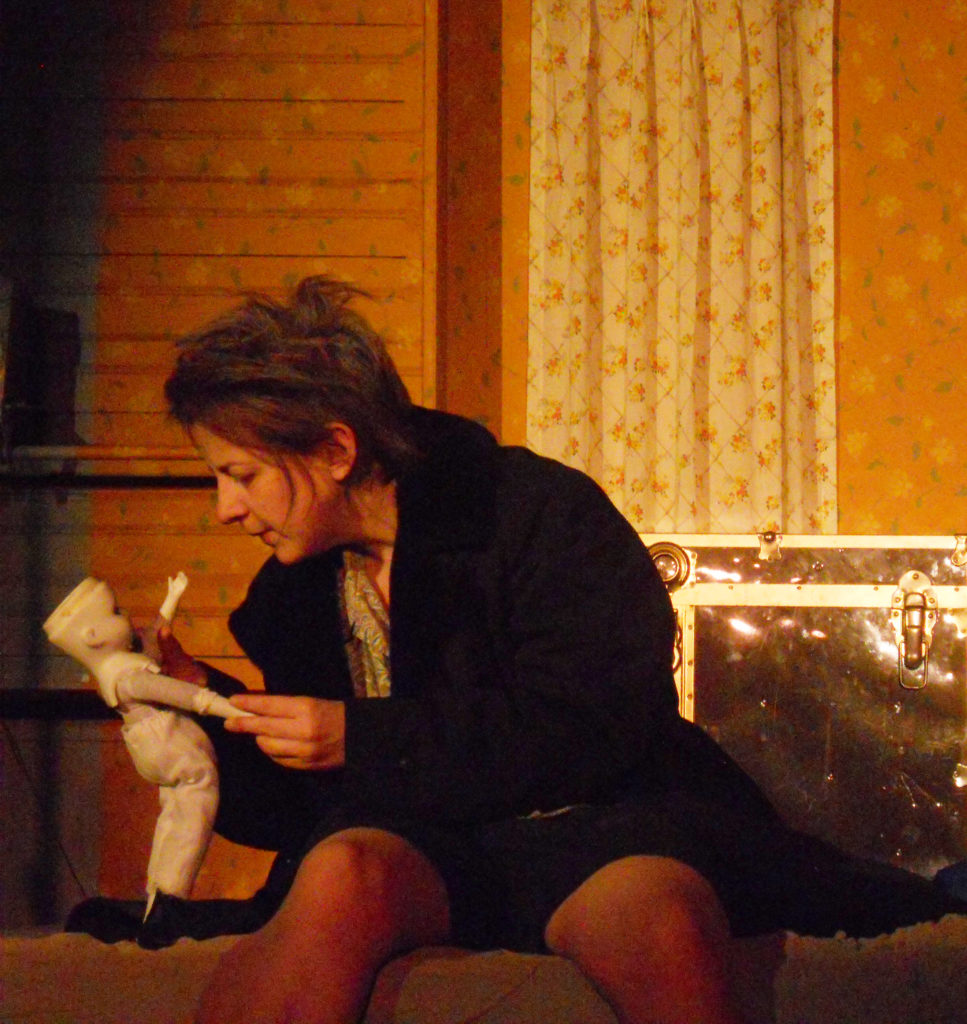Early in Shakespeare’s The Tempest, there’s a longish scene of almost pure exposition as Prospero, a powerful scholar and magician, explains to his daughter Miranda why they are stranded on an enchanted island. Prospero had been the Duke of Milan until his brother stole his dukedom and sent them both out to sea on a rickety craft. By a miracle, they survived and arrived at the island, which they share with Caliban, a half-human creature who supposedly represents the basest and most earthy human instincts, and a creature of pure spirit, Ariel. And now, Prospero tells Miranda, he has called up a storm that will shipwreck his evil brother, his nephew Ferdinand and much of the court so that he can exact his revenge.
It’s from this scene that Buntport’s Wake: A Corruption of The Tempest by William Shakespeare derives its inspiration. Prospero is long gone here, but because he’s so present in the minds of Miranda, Caliban and Ariel, and because the story he told Miranda provides the structure for their lives, he haunts the stage. Except that what he described never happened: no storm, no ship, no prince for Miranda, no revenge, no forgiveness. All the three characters have to give their existence any shape is a cassette tape of Prospero’s that tells the ending of the story, but they’re forbidden to listen to it. On a set consisting of ramps, white tree branches, an upper room and a grass-topped cage containing Caliban, they wait. This Miranda is no beautiful princess-to-be, but a wild, mucky girl with haystack hair who — as Caliban points out to her — now smells as bad and fishy as people in The Tempest used to say he did.
Miranda’s relationship with Caliban is intense. Sometimes they’re a pair of children exploring or squabbling; sometimes she bullies him, teases or pulls rank; sometimes she’s tender. And as Caliban alternately whimpers, threatens to attack, mocks her or himself, it’s clear that he’s in love with her. Caliban was always a complex character — Shakespeare gave him some of the loveliest speeches in this play — but in Wake, everyone is trapped inside Prospero’s story, and to Prospero, Caliban was nothing but a brute. Meanwhile, ethereal spirit Ariel has become an ambiguous, gray-clad figure, someone Miranda summons with an imperious gesture when she wants something and who — as Prospero’s representative — intervenes when chaos threatens.
Prospero renounces his magic toward the end of The Tempest, breaking his staff and drowning his book. This is a late Shakespeare play, and it’s believed that Prospero represents the playwright himself bidding goodbye to his work and the multifarious worlds he created. In Wake, Prospero’s exit is less poetic and more despairing. It shatters what might have been a genuine moment of transcendence and jolts the action into fast-forward.
The acting in Wake is absolutely astounding. Erin Rollman gives herself completely to the role of Miranda, and lives it with passion and intelligence. Brian Colonna’s Caliban is rich and full — strong, squirming, ironic, childish and evocative. We’ve all seen many Prosperos: They have power and dignity; they tower over the action; their statements are grave and significant. But in his big gum boots, Erik Edborg’s Prospero is unique — loving with Ariel, hectoring Miranda and bullying Caliban — and he delivers the best-known lines in The Tempest in ways you’ve never heard them before. The Buntporters collaborated with musician Adam Stone on Wake and in addition to creating the island’s soundscape, Stone plays Ariel. He’s anything but the elfin character we might expect, but there is something ethereal about both Stone’s music — unearthly sounds, dissonances, snatches of song, bits of melody — and his quiet, intense presence.
Wake is imagistic, suggestive and evocative rather than logical. Irresistibly reminiscent of Samuel Beckett’s Waiting for Godot, the play is also completely original. It’s about the way artists shape reality and narrative shapes worlds. And also about music, waiting, being half-mad with boredom and — in an unexpected moment as brief and radiant as a firefly flickering in the darkness — love. Like Vladimir and Estragon, Miranda, Caliban and Ariel find ways to pass the time — which, as Estragon commented, would have passed anyway. Like Beckett himself, the Buntporters find a music in nothingness and in the search for meaning where meaning can’t be found.
-Juliet Wittman, January 31, 2013, Westword
